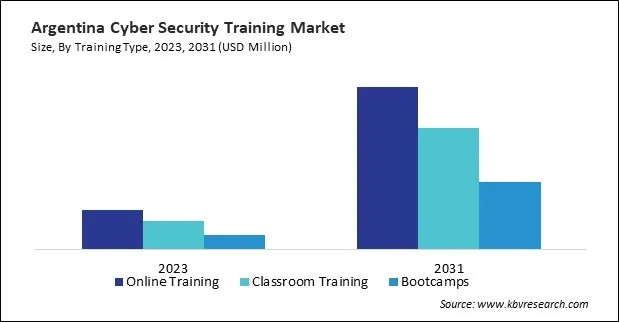The Latin America, Middle East and Africa Cyber Security Training Market would witness market growth of 19.3% CAGR during the forecast period (2024-2031).
The Brazil market dominated the LAMEA Cyber Security Training Market by Country in 2023, and would continue to be a dominant market till 2031; thereby, achieving a market value of $337.7 million by 2031. The Argentina market is showcasing a CAGR of 19.9% during (2024 - 2031). Additionally, The UAE market would register a CAGR of 18.9% during (2024 - 2031).

Organizational operations have been significantly transformed by technological advancements, including cloud computing as well as the Internet of Things (IoT), which have facilitated improved efficiency, flexibility, and connectivity. However, these advancements have also introduced new cybersecurity challenges, as these technologies' expanded attack surface and complexity create opportunities for cyber attacks. In response to these challenges, organizations increasingly invest in cybersecurity training to ensure their employees can effectively secure these technologies and protect against cyber threats.
Growing awareness of cybersecurity threats is prompting organizations to invest more in cybersecurity training for their employees. This heightened awareness stems from the increasing frequency and sophistication of cyber attacks and the high-profile data breaches that have affected organizations across industries. Organizations are realizing that investing in cybersecurity training is essential for protecting their business operations, reputation, and customer trust. Overall, the growing awareness of cybersecurity threats and the importance of protecting against them is driving organizations to invest more in cybersecurity training.
The ITA stated that the Kingdom of Saudi Arabia has also experienced a 16% increase in cloud services after launching its Cloud First Policy in 2019 to speed up cloud adoption across the public and commercial sectors. In August 2017, a decision was made by the Saudi Council of Ministers to institute the General Authority for Military Industries (GAMI). It represents the Saudi Arabian Government's (SAG) intention to develop and localize its military production capabilities and turn them into a substantial economic pillar. GAMI's role in developing and localizing military production capabilities further emphasizes the importance of cybersecurity in protecting sensitive military information and infrastructure. Therefore, as these countries continue to digitize their economies and invest in new technologies, cyber security training will remain a critical focus to protect against cyber threats and safeguard digital assets.
Free Valuable Insights: The Worldwide Cyber Security Training Market is Projected to reach USD 14.95 Billion by 2031, at a CAGR of 16.8%
Based on Certification, the market is segmented into Industry Standard Certifications, and Vendor Specific Certifications. Based on Target Audience, the market is segmented into Enterprises, and Individuals. Based on Training Type, the market is segmented into Online Training, Classroom Training, and Bootcamps. Based on Delivery Method, the market is segmented into Self-pace Training, Instructor-Led Training, and Blended Training. Based on Content, the market is segmented into Foundational Cybersecurity, Technical Skill Training, Compliance Training, Emerging Technologies Training, Cybersecurity Leadership & Others. Based on Industry, the market is segmented into Telecom & IT, Government/Defense, Energy, BFSI, Healthcare, Manufacturing, and Others. Based on countries, the market is segmented into Brazil, Argentina, UAE, Saudi Arabia, South Africa, Nigeria, and Rest of LAMEA.

By Certification
By Target Audience
By Training Type
By Delivery Method
By Content
By Industry
By Country
Our team of dedicated experts can provide you with attractive expansion opportunities for your business.

